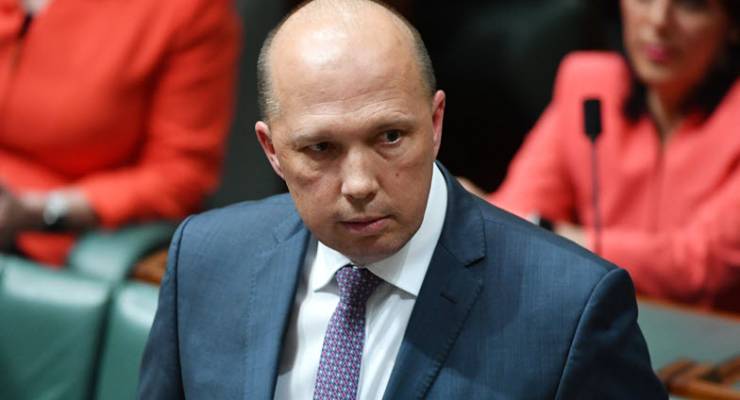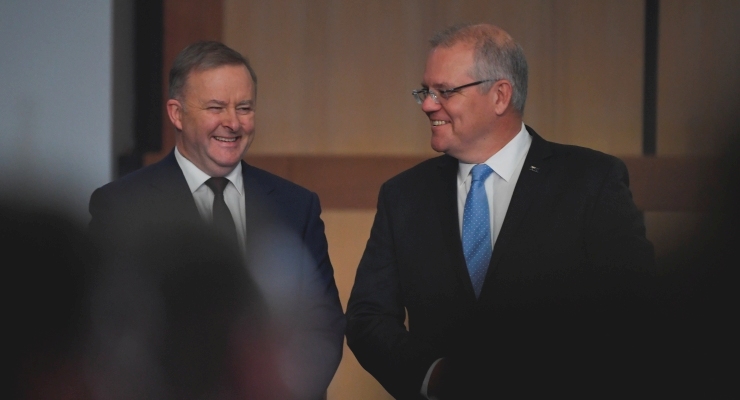
MAKE UP YOUR MIND
Home Affairs Minister Peter Dutton approved department cuts which he then publicly condemned, The Age/SMH reports.
After the papers revealed cuts to border patrols in December, Dutton said the savings had not been sanctioned by him, stating, “I’ve given very specific direction to the Australian Border Force commissioner that we won’t be reducing those patrols at all.” Documents obtained under freedom of information laws reveal, however, that Dutton signed off on the budget measures the day before, despite warnings the changes would affect the performance of the department.
DEEMING DRAMA
Retirees are demanding a permanent fix to pension “trickery” as the government prepares to make a decision on deeming rates, The Age/SMH report.
Seniors Australia is demanding a new, independent mechanism for setting the rate, used to work out the income made from financial assets to assess pension payments, as pressure mounts to reduce the rate from 3.25% to closer to the official interest rate of 1%. Seniors Australia advocate Ian Henschke told The New Daily that the government was short-changing pensioners: “How can you go to an election accusing Labor of having a retirees tax, when you’ve been running your own pensioner tax?”
New analysis by Labor shows that part-pensioners stand to gain between $62 and $3875 a year, depending on the size of their assets, if the government cuts the rate by 1.25%.
CLIMATE CRISIS ARRIVES
The UN has warned that climate change disasters are now occurring at a rate of once per week, with work urgently needed to prepare developing countries for the impacts, The Guardian reports.
The UN special representative on disaster risk reduction Mami Mizutori said that large numbers of “lower impact events” that aren’t grabbing headlines are nevertheless causing death, displacement and suffering weekly, with the cost of such disasters estimated at $520 billion per year. Mizutori emphasised the need for investing in “adaptation and resilience”, such as building global warming resistant infrastructure, with the window for mitigating many of these disasters behind us.
[free_worm]
THEY REALLY SAID THAT?
We obviously went to the election saying that we wanted to review it, (but) we lost the election. We’re three years away again from another election and being able to do something about it.
Catherine King
Labor’s infrastructure spokesperson tells Insiders that Newstart payment levels are unlivable, but fails to justify voting against their increase.
READ ALL ABOUT IT
Income tax cuts: Labor ‘concerned’ but won’t commit to repealing stage three yet
South Australia’s ‘horror’ flu season prompts emergency warnings
Welfare: Government committed to ‘brutal’ plan to dock payments
‘Free Hong Kong!’: Protesters’ demands widen as rallies continue
Christchurch killer’s theories seeping into mainstream, report finds
Iran: Nuclear deal in jeopardy after latest enrichment breach
National action urged on deadly stone dust disease ($)
Pocketing allowance a ‘betrayal of shareholders’ if company CEOs copied our MPs ($)
AGL says Narrabri coal seam gas project won’t ease pressure on prices
Afterpay to lean on millennial ‘moat’ in trillion dollar battle with Visa
Federal police forced Qantas to hand over the private travel records of an ABC journalist
Spy games not reason for Alek Sigley’s detention, observers say
Only acceptable goal’: grants to boost healthy ageing for Indigenous
Government pays $35.9m to aid farmers’ conservation
‘It’s a statistic that should be published’: Push for count of women killed by violence
Luxury Blue Mountains hotel group clawing back wages from migrant workers
Man charged after scaling Harbour Bridge in protest against Iran
Bob Hawke’s childhood home in SA to be renovated after Government sets aside $750k
CRIKEY QUICKIE: THE BEST OF YESTERDAY
Saving private citizens: how Australia uses diplomacy to rescue prisoners
“In extradition and extrication cases, Australia can use two methods: official representation or goodwill and relationships. In Greste’s case and that of filmmaker James Ricketson who was jailed in Cambodia, Australia used the Department of Foreign Affairs and Trade to secure the journalists’ release. In cases such as Sigley’s, Petrov said, there’s more focus on ‘soft power, communication behind the scenes, and goodwill’. ‘Countries like Australia are still treated as suspicious and distrustful because of our involvement in the Korean war,’ he said. ‘Official representation may not have worked, and diplomatic relations are often damaged by Australia’s participation in military exercises.’”
Don’t expect much press freedom from the politicians
“The message from News Corp to Labor is clear — Campbell Reid might parade around Parliament House calling for his journalists to be protected, but those journalists, at the instruction of News Corp editors, will savage Labor as weak on national security the moment they allow any distance to come between them and the government. From Labor’s point of view, why on earth would you bother defending media freedom in national security laws when that same media will savage you if they can for being weak on national security?”
The uncomfortable legacy of MH17
“If anything, the disaster of July 17 has made it clear that if we turn away from poverty and war it will eventually come to haunt us. In our world international terrorism as well as the unrestricted flow of weaponry have no regard for state borders, national sovereignty or human lives, and peace and security cannot be taken for granted.”
THE COMMENTARIAT
There’s only one way to deal with drugs to make Australia safer – Antony Loewenstein (The Age/SMH): “After a horrific summer that saw the death of many young Australians ingesting dangerous pills, the NSW coronial inquest into the tragedies begins this week. Pill testing could have saved these lives. The process is proven from countless trials in Australia, the US and Britain. I’ve spent the last four years reporting in countries that are being destroyed by the Washington-inspired drug war. From Honduras to Guinea-Bissau, the Philippines to Australia and the US to Britain, I’ve investigated how drug policy is used to marginalise minorities and the poor. Regulating and legalising drugs has the potential to fundamentally rewrite the narrative for a fairer and healthier world.”
Let’s give the public a taste of how a republic might work ($) – George Williams (The Australian): “Republicans should look for ways to resolve their differences and advance their cause before moving to a second referendum. They should look for ways to test different options and to remove links to the monarchy wherever possible. This has already occurred in some areas, such as through changing titles or oaths to make clear that public officials owe their allegiance to the Australian people rather than to the British monarchy. The next focus should be on how we appoint the governor-general and state governors. These representatives of the Queen are not subject to any form of public selection, and are appointed after nomination by federal and state leaders. This is inconsistent with how other public officials are chosen, and is at odds with the significance of these roles to the community.”
Money, votes and the ‘pendulum’ ($) – Richard Denniss (The Saturday Paper): “So if $53 million can’t buy a single seat, why do ministers debase themselves and sup with those willing to pay a few grand for the privilege of watching them eat? And why do political parties find it so hard to refuse donations from the tobacco, coal and gambling industries, even though in doing so they risk the wrath of voters by taking such tainted funds?”
HOLD THE FRONT PAGE

WHAT’S ON TODAY
National
-
NAIDOC Week runs from July 7 to July 14, celebrating the history, culture and achievements of Aboriginal and Torres Strait Islander peoples. A full list of events can be found here.
Melbourne
-
La Trobe University will host a panel on Australia’s asylum seeker deterrence policy, with Julian Burnside and Frank Brennan joined by Kurdish-Iranian writer Behrouz Boochani from Manus Island.
Sydney
-
The coronial inquest inquest into the suspected drug overdoses of young people at NSW music festivals begins.
-
The Sydney Environment Institute will host “Culture in Conversation: Creating Inclusive Food Communities” as part of NAIDOC Week, with Aunty Jennifer Quinlin, Aunty Agnus Ware and Catherine Jackson working with USU chefs to cook up soups, Johnny cakes, damper and more.
-
The University of Sydney will launch the Warburton Arts and Knowledge Project, showcasing the astonishing body of work by the Ngaanyatjarra people has been collected over the past 30 years in Warburton.
Darwin
-
The Aged Care Royal Commission will hold five days of hearings at the NT Supreme Court.
Adelaide
-
The City of Adelaide will host a NAIDOC Morning Tea and NAIDOC SA Awards with Lord Mayor of Adelaide Sandy Verschoor.
-
The South Australian Health & Medical Research Institute will host a discussion on the Uluru Statement from the Heart, with panellists including deputy chair of APY Lands Executive Board Sally Scales, director of Aboriginal Services: Aboriginal Legal Rights Movement Melissa Clarke, Ngarrindjeri Elder and cultural director Tal-Kin-Jeri Dance Group Uncle Major-Moogy Sumner, and Torres Strait Islander Elder and musician Uncle Eddie Peters.
Bendigo
-
Celebrations will kick off 2019 NAIDOC Week, including a civic reception, official flag raising ceremony, local guest speakers and musical performances.
Brisbane
-
Queensland treasurer Jackie Trad will lead a panel discussion, “The Federal Election and Climate Change”, discussing how Queensland can take action on climate change without marginalising the regions.











Dutton is lying again.
Why not? There are no penalties, and the regime runs on distraction and dead cats.
Dirtbag at his best.